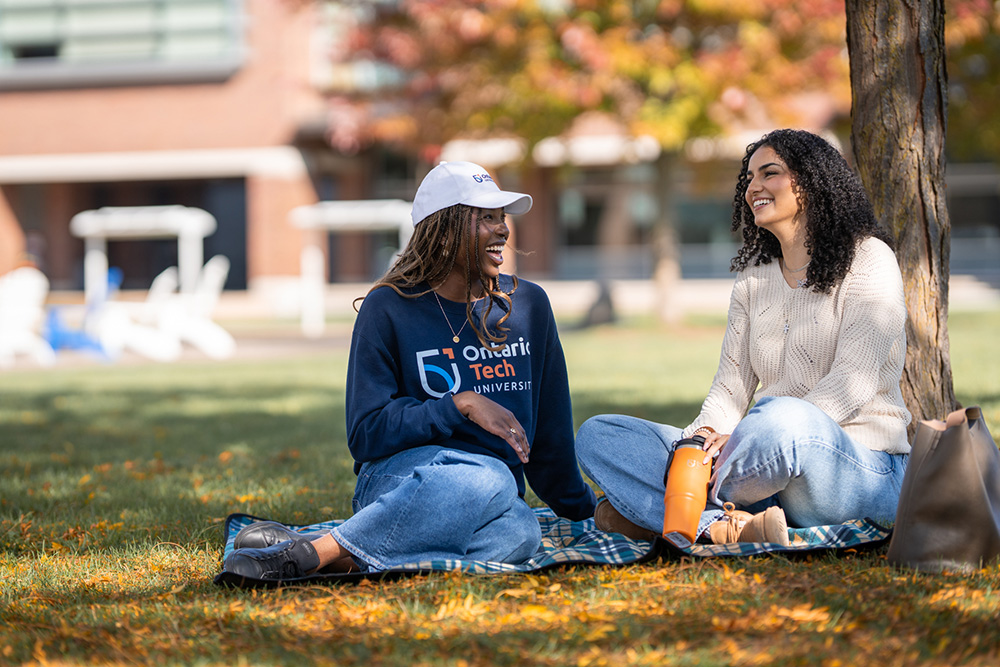UOIT students demonstrate CSI skills at innovative Crime Scene House
October 17, 2007
Students collect and analyze evidence as part of forensic science studies
OSHAWA, Ont. - Students at the University of Ontario Institute of Technology (UOIT) showcased their real-life CSI skills today with homicide; break-and-enter; and hit-and-run crime-scene scenarios playing out at the official opening of UOIT's innovative Crime Scene House.
Dr. Richard Marceau, UOIT's provost, and Dr. William Smith, dean of UOIT's Faculty of Science, were joined by Inspector David Kimmerly of the Durham Regional Police Service's Major Crimes Unit; Dr. Ray Prime, director of the Ontario Centre of Forensic Sciences; and Dr. Shari Forbes, UOIT assistant professor and Canada Research Chair-holder in Decomposition Chemistry, for a ceremonial cutting of crime-scene tape, tours, staged crime scenes and sample collection demonstrations.
"This is a very exciting day for UOIT," said Dr. Smith. "The dedication of our faculty, staff, students and partners has provided a leading-edge learning environment where students are able to collaborate with their professors and gain valuable hands-on skills in a one-of-a-kind facility. Strong partnerships with organizations such as the Centre of Forensic Sciences and the Durham Regional Police Service present our students with unique opportunities to learn from industry experts. The strong science base of our forensic science program and the real-world experience afforded by the Crime Scene House put our students one step ahead when they graduate."
The only university facility of its kind in Ontario, the Crime Scene House is where the UOIT Faculty of Science stages mock crime scenes as laboratory components within the Bachelor of Science (Honours) in Forensic Science program. Crimes scenes include bloodstain patterns simulating knife attacks, tool marks on windows indicating forced entries, upturned furniture displaying signs of struggle and shattered windshields demonstrating hit-and-run accidents.
Students receive hands-on training in the practical skills required by forensic investigators, including learning to collect and analyze data such as DNA, fingerprints, footwear impressions and tool marks; and examining the collected data in UOIT's forensic science laboratory. The training exposes students to the roles of both police officers and scientists in crime scene investigations.
"A unique facility such as this challenges and inspires our students to push their own boundaries of thinking and learning," said Dr. Forbes. "We are very fortunate to be able to provide our students with this exceptional learning environment. Skill building is an essential element of forensic science investigations and this facility provides UOIT students with the opportunities to build valuable hands-on skills as both investigators and scientists."
Each room in the Crime Scene House is equipped with a video camera for professors to monitor students conducting investigations and to observe techniques, including watching for possible contamination of crime scenes. Investigations are recorded for future reference and allow professors to review them with students.
Students are able to record data on-site on their laptop computers. A two-year tablet computer pilot project is currently underway involving third-year forensic science students, which allows them to make scene sketches, hand-written notes and utilize microscope functions. Using a portable wireless Internet connection at the Crime Scene House, they can transmit and share their data with students located in the forensic science laboratory on the main UOIT campus. This project will thus test the feasibility of this type of data collection and analysis by forensic practitioners, and put UOIT students at the forefront of emerging forensic science applications and technology.
The house was developed based on the concept of a similar facility in the United Kingdom, visited by Dr. Smith in 2003 when the UOIT forensic science program was being developed. After months of searching for an appropriate local facility, a former ranger's cabin was leased from Camp Samac. UOIT faculty, staff and students have donated their time and household items to clean and organize the house.
Dr. Forbes is a national leader in forensic science education and research, and was recently awarded the prestigious Tier 2 Canada Research Chair to continue her research work focusing on the role of lipid and protein degradation in the decomposition of soft tissue within varying environments. This chair will permit her to broaden the scope of her research to include geoforensics: a minimally researched, new forensic sub-discipline closely linked to decomposition chemistry. The research will further impact forensic science investigations, particularly regarding victims found in shallow graves and in varying seasonal temperatures.
About UOIT
As an innovative university, UOIT delivers a leading-edge learning environment that uniquely combines academic knowledge, research opportunities, hands-on skills and a vibrant student life. UOIT's 5,000 students are taught by professors who are experts in their fields from around the world. As Ontario's first laptop-based university, the university offers a diverse array of challenging undergraduate and graduate degree programs through its faculties of Business and Information Technology; Criminology, Justice and Policy Studies; Education; Engineering and Applied Science; Health Sciences; and Science, and its School of Energy Systems and Nuclear Science. UOIT's commitment to research excellence has resulted in millions of dollars in grants and awards, including five Canada Research Chairs. To find out more, visit www.uoit.ca or call 905.721.8668.
About Ontario Tech University
A modern, forward-thinking university, Ontario Tech advances the discovery and application of knowledge to accelerate economic growth, regional development and social innovation. We inspire and equip our students and our graduates to make a positive impact in a tech-focused world. For us, it’s not only about developing the next tech breakthrough. Understanding and integrating the social and ethical implications of technology differentiates us as university. Learn more at ontariotechu.ca.
Media contact
Melissa Levy
Communications and Marketing
Ontario Tech University
905.721.8668 ext. 2513
melissa.levy@uoit.ca



